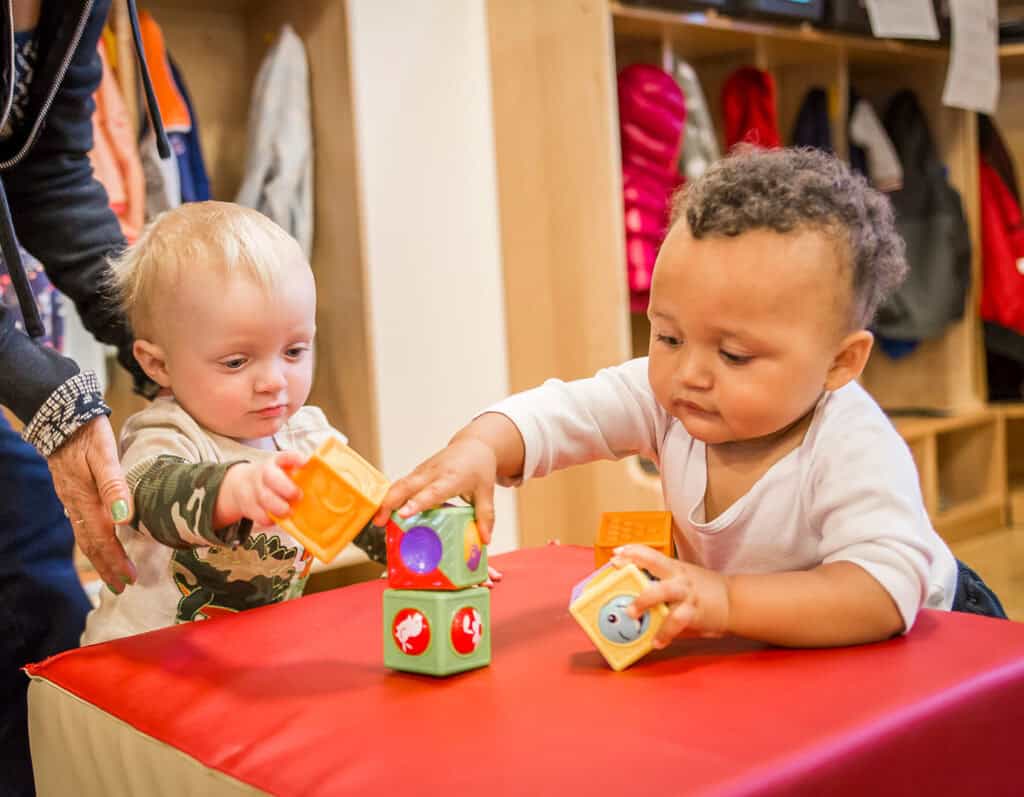Returning to in-person learning after the onset of the COVID-19 pandemic brought many changes to early learning and care programs across the country, from classroom closures to online activities, new family engagement strategies to creative playtime ideas.
At Educare Kansas City, part of the University of Kansas Medical Center’s Project Eagle, school staff soon noticed a higher need for additional support of children’s social-emotional and resiliency skills. Recognizing that children, families and even staff have had and continue to experience various traumatic events, the Educare team decided to strategically address this need. That’s why they used grant funds to support the implementation of a schoolwide Conscious Discipline curriculum, a research-based and trauma-informed methodology that offers solutions for self-regulation and social-emotional learning – in short, a classroom program that helps young children process big feelings.
Conscious Discipline in the Classroom
One such student who benefited from the Conscious Discipline program is Kry’Shonnah, who first joined her older siblings Quan’Shaye and Quan’tezz at Educare back in 2018, when she was just three months old. Today, she is four years old and enrolled in an Educare preschool program.
Like many students, Kry’Shonnah’s time at Educare was interrupted by the pandemic, but she has been back attending school in-person since August 2021. Also like many students, the pandemic created areas of need in Kry’Shonnah’s social-emotional skills, including self-control, appropriately expressing emotions and working through big feelings.
Kry’Shonnah’s teachers (Ms. Kenesha, Ms. Hannah, and Ms. Gabby) and mom Quanisha were worried about her ability to self-regulate her emotions – so, together, they brainstormed ways to help Kry’Shonnah in the classroom and at home. The classroom teachers worked with their mentor teacher, Delinda, to determine which Conscious Discipline strategies and materials would be most helpful for Kry’Shonnah. Ultimately, they decided to introduce “9 Steps for Active Calming Centers” – not only for Kry’Shonnah, but for all students in their classroom.
What is the Active Calming Center?
The Active Calming Center is a multi-step tool that assists children in channeling and calming physical impulses and big emotions. The purpose is to teach children to manage their internal upset so they can return to the calm, alert internal state that is ideal for learning.
The 9 centers – which are 1) stomp it out, 2) push the wall, 3) flex it out, 4) count it out, 5) trace the rainbow, 6) work task, 7) yoga poses, 8) S.T.A.R. breathing and 9) go to the safe space – provide a variety of calming sensory experiences for children to choose from. With centers placed all around their classroom, students can choose any of the centers to help them control their BIG feelings when they are experiencing upset.
Teachers introduced these centers slowly over a period of several months during times when the children were calm, so they could learn how and why each center was used. Kry’Shonnah first practiced these skills when she was calm; now, she’s able to utilize the centers when she is experiencing a BIG feeling. Her favorite center is “flex it out,” where she stands on the footprints on the mat, pulls the exercise band upward, and counts her reps to 10.
Increasing Self-Regulation Skills
Since introducing these centers, Kry’Shonnah has shown an increased ability to recognize when her big feelings are coming and can now calm herself before reengaging in classroom activities. She has also been able to better handle conflicts with peers and has increased her self-regulation skills – all hallmarks of the Conscious Discipline program and evidence of how Educare Kansas City is helping children learn to embrace their big feelings.
